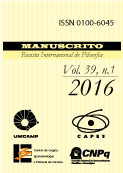Abstract
In this paper I challenge the widespread assumption that the conditions for singular reference are more or less the same as the conditions for singular thought. I claim that we refer singularly to things without thinking singularly about them more often than it is usually believed. I first argue that we should take the idea that singular thought is non-descriptive thought very seriously. If we do that, it seems that we cannot be so liberal about what counts as acquaintance; only perception (and memory) will do. I also briefly discuss and reject semantic instrumentalism. Finally, I argue that while singular reference is cheap, singular thought comes only at a price.References
ALMOG, J. “Semantical Anthropology”, Midwest Studies in Philosophy, IX, 479-489, 1984.
ALMOG, J. “Is a Unified Description of Language-and-Thought Possible?”, The Journal of Philosophy, Vol. 102, No. 10, 493-531, 2005.
ALMOG, J. “Referential Uses and the Foundations of Direct Reference”. In Almog and Leonardi (eds). Having in Mind: The Philosophy of Keith Donnellan (pp. 176-184). Oxford: Oxford University Press, 2012.
AZZOUNI, J. “Singular Thoughts (Objects-Directed Thoughts), Proceedings of the Aristotelian Society Supplementary Volume lxxxv, 45-61. 2011.
BACH, K. Thought and Reference. Oxford: Oxford University Press, 1987.
BACH, K. “Putting a Thing into a Thought”. In New Essays on Singular Thought (pp. 39-63). Oxford: Oxford University Press, 2010.
BORG, E. Minimal Semantics. Oxford: Clarendon Press, 2004.
BORG, E. “Pointing at Jack, Talking About Jill”, Mind & Language, Vol. 17, Issue 5, 489-512, 2002.
GLEZAKOS, S. “Public proper names and idiolectal identifying descriptions”, Linguistics and Philosophy. 32:317-326, 2009.
HAWTHORNE, J. & MANLEY, D. The Reference Book. Oxford University Press, USA, 2012.
JESHION,R. “Donnellan on Neptune”, Philosophy and Phenomenological Research Vol. LXIII, No. 1, 111-135, 2001.
JESHION,R. “Singular Thought: Acquaintance, Semantic Instrumentalism, and Cognitivism” in New Essays on Singular Thought (pp. 105-140). Oxford: Oxford University Press, 2010.
KAPLAN, D. “Demonstratives”, in Almog, Perry and Wettstein. (eds.). Themes from Kaplan (pp. 481-564). Oxford: Oxford University Press, 1989a.
KAPLAN, D. “Afterthoughts”, in Almog, Perry and Wettstein. (eds.). Themes from Kaplan (pp. 565-614). Oxford: Oxford University Press, 1989b.
KRIPKE, S. Naming and Necessity. Harvard University Press, 1980.
LEWIS, D. “Attitudes De Dicto and De Se”. The Philosophical Review, Vol. 88, N°. 4, 513-5431979, 1979.
RECANATI, F. “Singular Thought: In Defense of Acquaintance”. In New Essays on Singular Thought. (pp. 141-190). Oxford: Oxford University Press, 2010.
RECANATI, F. Mental Files. Oxford: Oxford University Press, 2012.
RUSSELL, B. “Knowledge by Acquaintance and Knowledge by Description”. In Mysticism and Logic (pp. 209-232), London: Unwin, 1949.
SALMON, N. “Demonstrating and Necessity”. In Content, Cognition, and Communication (pp. 67-99). Oxford: Clarendon Press, 2007a.
SALMON, N. “The Good, the Bad and the Ugly”. In Content, Cognition, and Communication (pp. 309-339). Oxford: Clarendon Press, 2007b.
SCHIFFER, S. “Descriptions, Indexicals, and Belief Reports: Some Dilemmas (But Not the Ones You Expect)”. Mind, New Series, Vol. 104, No. 413, 107-131, 1995.

